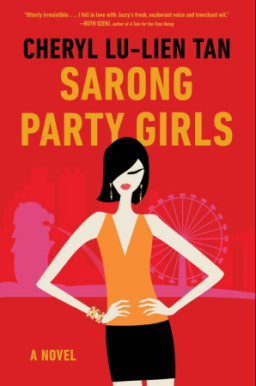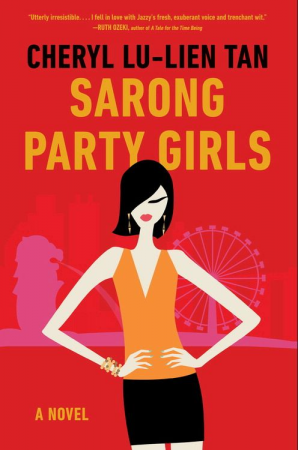 Cheryl Lu-lien Tan’s brilliant novel Sarong Party Girls takes a peek behind the sarong and shines the spotlight on Asian vamps with a mission to marry the right man
Cheryl Lu-lien Tan’s brilliant novel Sarong Party Girls takes a peek behind the sarong and shines the spotlight on Asian vamps with a mission to marry the right man
THE scene is set in an exclusive bar with pulsating music and strobe lights. Here enters a staid white man looking incongruous in his Hawaiian print shirt and Bermuda shorts. And holding onto his arm like a piece of decorative eye candy is a beautiful Asian girl.
The Sarong Party Girl phenomenon where expatriates are viewed as prime property ready to be conquered by enterprising Asian social climbers as a ticket to a better life is thriving in Singapore, as alluded to by Cheryl Lu-lien Tan whose comedic, irreverent novel Sarong Party Girls has debuted to rave reviews.
Sarong Party Girl or SPG is a derogatory slang used in this part of the region describing a local Asian woman who exclusively dates a white man. Tan’s novel, which zooms into the loves and lives of SPGs in Singapore, presents you the protagonist Jazzy, an unashamed SPG whom you’d love to hate, but end up loving anyway.
Brilliantly captured in Singlish —colourful patois spoken colloquially in Singapore, the novel captures in full colour the life of 27-year-old Jazzy, who, along with her girlfriends, plots a plan to snag themselves the ultimate status symbol of all — a rich ang moh — Western expat – husbands.
COLONIAL PARTY GIRLS
The Sarong Party Girl isn’t a new phenomenon or a new breed of women out to get their freshly-painted talons into a hapless white man. Originating in colonial Singapore when British forces personnel socialised exclusively amongst themselves, they occasionally brought local women to their parties where the term “Sarong Party” came into use to describe these social gatherings. The sarong refers to a long piece of cloth wrapped around the body and traditionally worn by Southeast Asian women (and men).
The novel offers a voyeuristic view into the effects of this colonialism and how the SPG has evolved from the docile submissive stereotypes to become materialistic vamps bent on snagging expatriates with fat bank accounts.

“I’ve always been fascinated with them and by that whole culture in Singapore of materialism and status, and how race fits into that. Why do we value white men above Chinese or Indian or Malay? In a sense, it’s a holdover from our colonial days,” says Tan in a recent interview with The Slate Book Review.
BRINGING SPGS TO LIFE
Sarong Party Girls’ provincial heroine Jazeline “Jazzy” Lim Boon Huay is on a tight deadline to get herself a white expat husband because anything less than that would be a failure. “Aiyoh, we have to figure out how to make this happen — and we have to do it now,” she exclaims.
Jazzy and her best friends Imo and Fann decide to get serious in snagging themselves a white man.
This audacious, unpolished heroine comes up with a one-month game plan in which reconnaissance into the best areas where potential Caucasian husbands congregate and identifying their competition figure prominently. This ambitious plan and Jazzy’s brazen first-person narrative form the backbone of Tan’s book, which is both outrageous and funny, giving the reader an inside look into the mind and thoughts of a SPG.
If Jazzy’s story and voice sounds so believable, it is credit to Tan’s research into the Singapore nightlife scene. In an interview with the Straits Times, Tan confided: “I had this group of friends who married in their 20s and got divorced in their 30s, and they told me, ‘If you want to see us when you’re back, you’ve got to come out with us.’ One of the scenes in the book has an auntie dancing in a podium with a fluorescent bra on. That’s something that actually happened when we were out’.”
MORALS AND DOLLARS
Against the dark backdrop of dodgy bars and countless vignettes on gender disparities and blatant sexism practised in Jazzy’s world, her resilience brings her through all her misadventures not quite unscathed. But Jazzy has learnt to deal with her lot with stoic acceptance.
Sometimes to get to Prince Charming, you’ve got to kiss a lot of frogs. And Jazzy does just that, without taking her eyes off her main goal. In Jazzy’s mind, without education and a high-paying job, the only ticket out is a good marriage with the right man. And the right man is, of course, the ever-elusive white man with a good career who’s ready to make an honest woman out of her.
A good story is when the ending isn’t a typical cliched fairy tale. And Tan tells a great story with Jazzy. As you follow her life through the streets of Singapore, applaud her chutzpah in trying to get what she wants and cringe at the way she’s mistreated, you get mesmerised by Jazzy’s voice. With all the curses and crass language that creeps into her sentences, she’s unmistakably unique and extremely likeable.
The stereotype portrayed may not necessarily rest well with the rest of us single women out there who don’t need a Prince Charming to sweep us off our feet and pay for that Prada handbag. And Tan has been accused of propagating the notion that the Asian woman needs a rich man to help her get ahead with life. “I write about things that fascinate me and, in this case, it’s SPGs. I hope people see the book for what it is,” she said.
And while the book whips up a storm of story about SPGs, it really tells a tale about a woman who finds herself in the midst of trying to find a husband. There’s no white man (or any man for that matter) waiting at the end to ride her off into the sunset, and it’s just as well. We all rescue ourselves in the end, and it’s an ending every woman will applaud.
Published in the New Straits Times 13th November 2016
